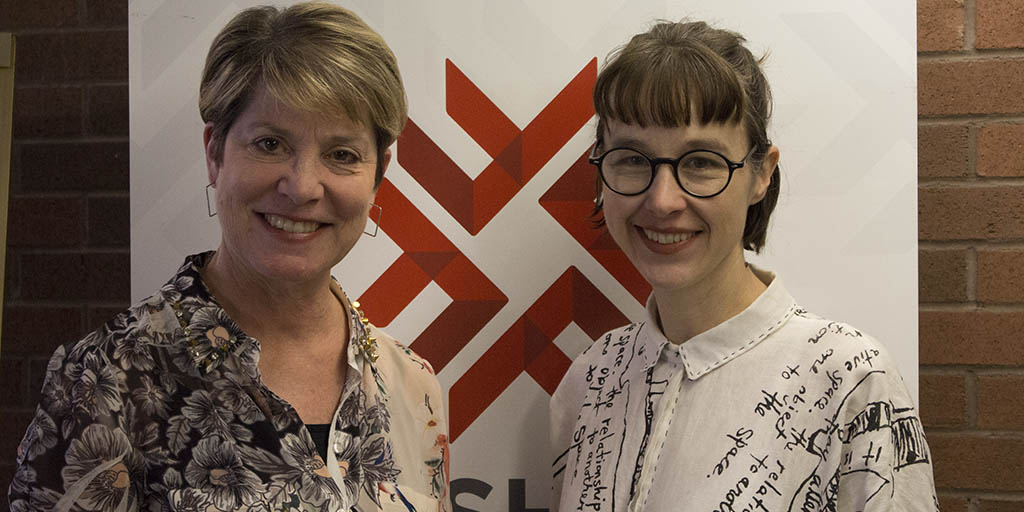New grant paves way to Fast Fashion solutions
 CREDIT: ANGELA MCINNES
CREDIT: ANGELA MCINNESJennifer Wright (left) and Meredith Jones (right), from Fanshawe's fashion design program, are using a new research grant to tackle Fast Fashion and workforce integration.
The Natural Sciences and Engineering Research Council of Canada has awarded Fanshawe College a $240,000 research grant to develop a new Fast Fashion re-manufacturing model while providing internships to primarily female newcomer populations in Canada.
The two-year College and Community Innovation (CCI) grant, from the Community and College Social Innovation Fund (CCSIF), is being used to launch a project entitled “Poorly Made Shirt Workers (PMSW): a social solution for integration into the Canadian workforce”.
The project is a joint collaboration between the College, Goodwill Industries, Ontario Great Lakes and Arcane-London.
Jennifer Wright and Meredith Jones, faculty in fashion design at Fanshawe College, are at the helm of PMSW, which will run until May 2020.
“When we talk about the poorly made shirt, we're talking about the situation in which the shirt's being manufactured, and the environmental and social impact,” Jones said to Interrobang.
According to a news release issued on Nov. 5, the overall goal of PMSW is to provide solutions for both environmental sustainability and the social and economic sustainability of textile workers in Canada, who are predominantly immigrant women.
It also aims to raise awareness of the environmental costs of the Fast Fashion industry, as well as the barriers to economic participation faced by immigrant women.
Findings from previous research around the destructive nature of Fast Fashion conducted by local enterprise Carmina de Young Fashion Design Inc. and Goodwill Industries inform the project.
Wright and Jones said that they also draw inspiration for the project by getting to know newcomers to Canada through volunteering with the women's sewing group at the London Cross Cultural Learner Centre. They work with the non-profit employment support service, WIL Employment Connections, as well.
“The first part of our plan is that we're meeting the Cross Cultural Learner Centre, Goodwill Industries and Wil Employment to put together newcomer groups that will participate in focus groups. We can talk to them about what their newcomer experience is, where their challenges lie, what type of Canadian workplace education they might like to have, what supports they feel are valuable,” Wright said.
“A lot of this research has been done in a general sense, but we also want to know things like if we're setting up a skills training and manufacturing model that you would eventually be employed in, what's the best time of day for you to work? What are your challenges to get into work? We're actually trying to get it drilled down to an individualist personal level.”
During the project's initial stages, PMSW researchers will also investigate the needs of employers in the community that hire in the apparel industry. This information will help them put together a social benefit program that combines training for apparel skills and Canadian workforce integration.
Jones said that the collaborative research project aligns apparel workers with the fashion industry's growing interest in better managing textile waste.
“We know that going into the future, we're looking more and more at textile waste, and how do we use that as a resource for new products,” said Jones. “That's not just learning how to sew, it's looking at used textile waste and sorting for fibre reuse, looking at it in terms of how would you take something and recut it, what is the quality control and sorting processes.”
Jones added, “I'm a believer that design can change people and can tell such a meaningful story. We hope that the products that are coming out of this social enterprise will embed the story of the original maker overseas, so people are aware of that story and also the story of how meaningful the newcomer is to Canada.”
















